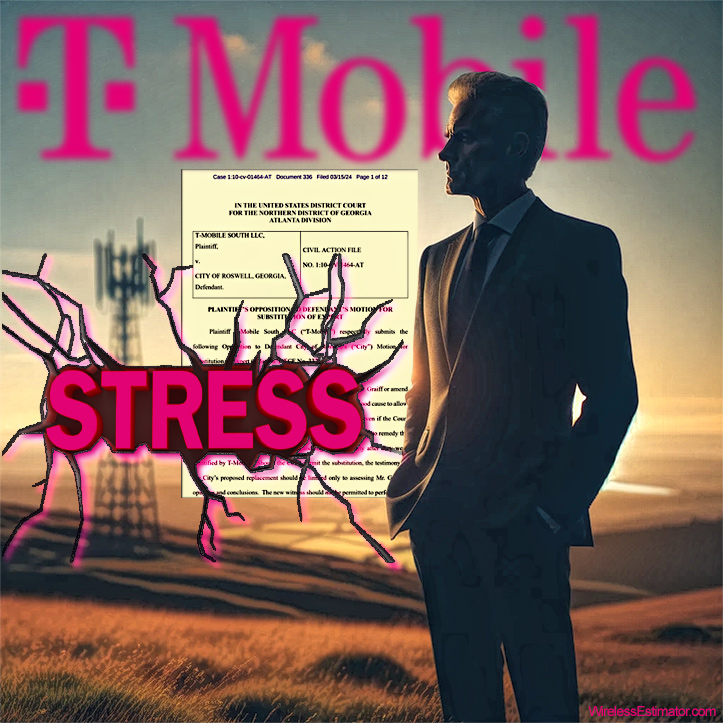
Roswell, Georgia’s lead counsel, knew that professional engineer Ronald Graiff was their foundation of RF engineering support for defending T-Mobile’s lawsuit against the city, and was taken back when he quit on March 2, 2024, stating it was due to his “mental stress, his age, and his personal situation.” T-Mobile disagrees, alleging that he only resigned after they presented in a pretrial brief “the fundamental flaws in Mr. Graiff’s opinions and, critically, his failure to use any standard methodologies or tests to produce any concrete evidence supporting his opinions.”
This week, T-Mobile continued its 14-year battle with Roswell, Georgia, to erect a 108-foot monopine near Lake Charles Drive that was denied multiple times.
The ongoing lawsuit is the costliest and most protracted siting litigation in the United States, with both parties shelling out well over a million dollars in legal fees since T-Mobile filed the complaint in 2010.
It is also the first time a lawsuit might hinge on a carrier’s opposition to a defendant’s motion to substitute an expert for a consultant incapable of continuing because of his age and emotional state.
On March 2, 2024, the city’s RF engineering expert, Ronald Graiff, 78, unexpectedly resigned as Roswell’s consultant due to “mental stress, his age, and his personal situation,” according to an email Graiff sent to lead counsel for the City of Roswell, Angela Couch.
Couch said she had talked to Graiff on March 1, 2024, and “he unequivocally stated that he was finished with this case and that he could no longer take the stress. He abruptly terminated the call after flatly stating, ‘don’t call me anymore.’ “
Graiff was hired in February 2017 and communicated on occasion regarding the case status. When the city received a declaratory ruling in March 2023 that the case would be active again, Graiff agreed to continue to assist the city and, as in the past, would be the foundation of the city’s defense.
On March 8, 2024, the city requested the court to substitute RF expert Ben Levitan for testimony at an evidentiary hearing on June 20, 2024. Levitan will explore the possibility of small cells/nodes in the area, any co-location opportunities, and the effectiveness of the proposed monopine site relative to the identified gap at $495 per hour.
On March 15, 2024, T-Mobile opposed the city’s substitution of an expert, stating that if the court did, Levitan should be limited to assessing Graiff’s opinions and conclusions.
T-Mobile said they would be prejudiced by Levitan’s substitution, mainly if new methodologies are used, and the court should order the reimbursement of T-Mobile’s costs incurred about the now-moot Graiff reports, deposition and preparation for his trial testimony.
T-Mobile alleges that Graiff only resigned as the city’s expert after the company had presented in its pretrial brief “the fundamental flaws in Mr. Graiff’s opinions and, critically, his failure to use any standard methodologies or tests to produce any concrete evidence supporting his opinions.”
“Mr. Graiff simply did not want to continue working on this case, and the city, having been alerted to the severe weakness of his testimony, was happy to let him walk away. Yet, ‘buyer’s remorse’ and seeking to ‘remedy’ the expert’s opinions is not good cause to substitute,” T-Mobile said in its court filing.
T-Mobile submitted to the court testimony that Graiff is still an expert consultant for the Town of Rhinebeck, New York Zoning Board of Appeals, and is expected to provide a report regarding Wireless Edge’s tower application today. They also noted that Graiff has not resigned as an expert witness in cases where he has been hired to represent communities in other lawsuits involving siting issues.
In its lawsuit, T-Mobile stated that it is entitled to recover its attorneys’ fees. In 2017, Roswell’s Mayor, Jere Wood, disclosed the city had incurred approximately $1 million in legal expenses due to the lawsuit. It is unknown what T-Mobile has expended.
Rejections heralded a victory from the U.S. Supreme Court
The siting feud arose in 2010 when T-Mobile proposed the tower, only to be unanimously turned down by the city council. The telecommunications company then took the matter to court, claiming Roswell was breaching the Telecommunication Act of 1996 by not providing specific reasons for the denial.
The case eventually reached the U.S. Supreme Court after an appeals court initially ruled in favor of Roswell. In 2015, the Supreme Court, in a 6-3 verdict, found that Roswell did not adequately explain its refusal to allow the tower’s construction. The case was sent back to a lower court for additional review.
In 2016, the 11th Circuit Court in Atlanta determined the case’s evidence was no longer current and directed both Roswell and T-Mobile to reassess the situation to identify any significant gaps in cell phone coverage and whether the proposed tower’s advanced technology could address them.
On July 24, 2017, the city council unanimously voted to again deny T-Mobile’s request to build the monopine.
On March 17, 2023, the U.S. District Court for the Northern District of Georgia set a date for resuming the previously discontinued evidentiary hearing.


















